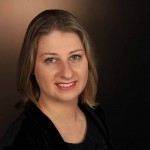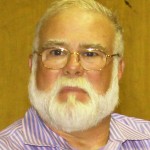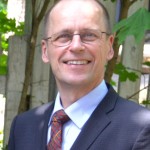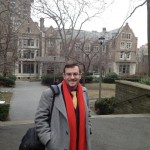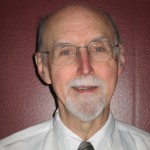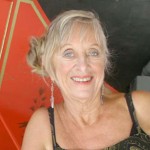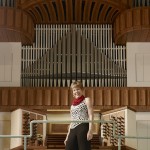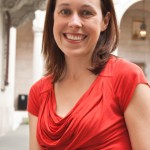Hook Morning at Cathedral of the Holy Cross
Handout
George Bozeman, moderator
Hook Morning at Holy Cross begins with a PowerPoint presentation by Barbara Owen on the History of Hook and Hook & Hastings organs, followed by a demonstration of the Holy Cross Cathedral organ by its long-time Organist and advocate, Leo Abbott, with its restorer, Robert Newton of Andover Organ Company. A presentation by Scot Huntington on the Hook Legacy: what the organs teach us and why we should care, will follow. Fritz Noack discusses Hook’s best period using the restoration at Mechanics Hall, Worcester, as example. The morning ends with a panel discussion among the morning’s presenters on the Influence and Legacy of E. & G. G. Hook (and Hook & Hastings) on the 21st Century, with George Bozeman, moderator.
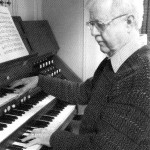
George Bozeman
George Bozeman majored in organ at North Texas State College (now North Texas University) under Dr. Helen Hewitt. He apprenticed as an organ builder with Otto Hofmann of Austin, Texas. Later work was with Joseph E. Blanton, Sipe-Yarbrough, and Robert Sipe. In 1967, he received a Fulbright grant to study at the Academy of Music in Vienna. He then worked for Fritz Noack, before starting his own firm in 1971. With his partner David Gibson, and later as sole proprietor, Bozeman’s firm completed some sixty projects in more than twenty states. Among these were several pioneering restorations of nineteenth-century American organs. He has maintained a church music career and played recitals across the United States and in Mexico, Canada, the Caribbean, and Europe. He is organist at First Congregational Church of Pembroke, New Hampshire, where he presides over Hook & Hastings’ Opus 1129 (1883).
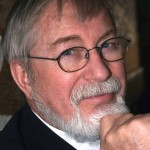
Fritz Noack
Fritz Noack was born in 1935 near the Baltic in Germany. During his school years, he developed strong interests in music, in particular violin and early music, and architecture, leading to an early decision to build organs. From 1954 through 1958, he apprenticed with Rudolf von Beckerath in Hamburg. Journeyman time with Klaus Becker, Ahrend & Brunzema, and—after immigrating to the United States—Charles Fisk preceded the founding of The Noack Organ Company in 1960. This firm has built 157 organs to date in most parts of the United States, Japan, and Iceland, and restored several important historic American organs. Mr. Noack has taught organ design at New England Conservatory and trained many organ builders in his workshop. From 2000 through 2006, he was president of the International Society of Organ Builders. He and his wife, Betje van Dam, a psychotherapist, live in Newbury, Massachusetts.
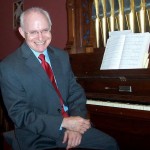
Leo Abbott
Leo Abbott is a graduate of the Boston Archdiocesan Choir School, Cambridge, and the Chaloff School of Music, Boston. His teachers include Theodore Marier, George Faxon, Clarence Watters, and Flor Peeters in organ; Naji Hakim in improvisation; and Julius Chaloff in piano. He holds the Fellowship and Choirmaster certificates of the American Guild of Organists (AGO), has won first prize in several international and national competitions, and was a finalist at the Grand Prix de Chartres in 1984. In 1986, he was appointed music director and organist of the Cathedral of the Holy Cross, Boston. He has performed throughout the United States and in France, Belgium, and Ireland, and for conventions of the AGO and the Organ Historical Society. He is an active member of the AGO, the Organ Historical Society, and the Conference of Roman Catholic Cathedral Musician. In 2010, he performed at Notre-Dame and Saint-Sulpice, Paris.
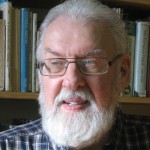
Robert Newton
Robert Newton, a Vermont native, studied mathematics at the University of Vermont. He is director of the Old Organ Department of Andover Organ Company, a leading restorer of nineteenth-century American organs. A nationally recognized authority on E. & G.G. Hook and Hook & Hastings organs, he has overseen the restoration of several important E. & G.G. Hook instruments, including those at First Parish Church in Bridgewater, Mass. (1852), Old South Church in Newburyport, Mass. (1866), and Andover’s work at Cathedral of the Holy Cross in Boston (1875); the latter, with work conducted by Andover, included the design of the new reproduction console and the restoration of the Great 8’ Doppel Flöte and Pedal 32’ Contra Bourdon. Mr. Newton has served on the National Council of the Organ Historical Society and on several Society convention committees, most recently that of the 2013 Vermont Convention.
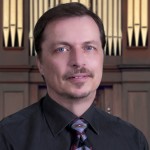
Scott Huntington
Scot Huntington is president of S.L. Huntington & Co., a nationally respected firm devoted to the building and restoration of historically informed pipe organs in Stonington, Connecticut. He began his organ study at Alfred University while in high school, and holds a Bachelor of Music degree, cum laude, in organ performance from the State University of New York, Fredonia. He has served the Boston AGO Executive Committee as a member-at-large, and has been a member of the chapter’s Organ Advisory Committee since its inception in 1984. He currently serves the American Institute of Organbuilders as chair of the Editorial Review Board, has chaired two conventions of the Organ Historical Society, and has served that organization as vice president, national councilor, founder and chair of the Publications Governing Board, and, most recently, as president. He has been organist of the United Church in Stonington, Connecticut since 1994.
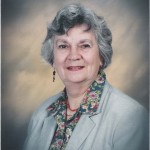
Barbara Owen
Barbara Owen holds degrees in organ performance and musicology from Westminster Choir College and Boston University. She is author of numerous articles, entries in The New Grove Dictionary of Music, and books, including The Organ in New England, E. Power Biggs: Concert Organist, The Registration of Baroque Organ Music, The Organ Music of Johannes Brahms, and The Great Organ of Methuen. She was Music Director of the First Religious Society of Newburyport (1963–2002) and Librarian of the AGO Organ Library at Boston University (1985–2012), and is currently active as organist, lecturer, and consultant. A former AGO regional councillor and dean of two chapters, she is past president of the Organ Historical Society and a trustee of Methuen Memorial Music Hall. Honors include the American Musical Instrument Society Curt Sachs Award, the Westminster Choir College Alumni Merit Citation, the Max Miller Book Award, and the Organ Historical Society Distinguished Service Award.

